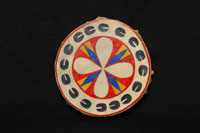OMAHA LANGUAGE CURRICULUM DEVELOPMENT PROJECT
UNL OMAHA LANGUAGE CLASS
The compiler of this webpage is solely responsible for its contents. Mention here of individuals, peoples, corporations, organizations, or tribal institutions does not imply that they endorse or are responsible for material included here.
Aho! Thathithe udon!
Hello! It is good that you are here!
This website is being developed to benefit students of the Omaha language and culture, wherever they may live. It has been initiated by the University of Nebraska-Lincoln (UNL) Omaha language class under the direction of Mark Awakuni-Swetland, instructor. The UNL Omaha language class is housed in the Department of Anthropology-Geography and is supported by the Institute for Ethnic Studies, Native American Studies Program.
The Omaha Language Curriculum Development Project (OLCDP) is an on-going effort by the UNL Omaha language instruction team and students to create materials for learners of Omaha where ever they may be. There are multiple components to the project including the creation of bilingual readers, revisions and expansion of an Omaha dictionary, compilation of a textbook, and the creation of on-line and audio material. The persons who have assisted in each component are cited below.
This site exists due to the creative energies of the UNL Omaha language students, native speakers, and teaching assistant Rory Larson. Additional creative and technical assistance comes from the UNL Center for Digital Research in the Humanities, under the direction of Katherine Walter, and the New Media Center, under the direction of Todd Jensen. The initial construction of this site is funding in part by a UNL Initiative for Teaching and Learning Excellence award, 2005–2006.
Data for this site come from many sources. Historic materials originate from the published and unpublished works of James Owen Dorsey, Alice Cunningham Fletcher, Francis La Flesche, Elizabeth Saunsoci Stabler, and Melvin Randolph Gilmore.
More recent language data come from the UNL Omaha language students 2000-2006, the Umonhon Language and Culture Center (ULCC) students and elder speakers at Umonhon Nation Public School (UNPS), John Koontz, and other Dhegiha language scholars.
The goal of this website is to provide access to Omaha language materials, both old and new. It is our earnest wish to help promote the Omaha language, culture, and the community from which it comes, as something that deserves our attention, admiration, and respect.
The impetus for this website comes from the very sobering fact that the Omaha language is in a critical state. Various tribal reports and observers have indicated less than 1% of the contemporary population, the most elderly, are active fluent speakers (<70, in 1994). An unknown number of adults in the community are passive speakers, meaning that they understand but do not speak the language routinely. Today, there are no children being born into households where Omaha is their birth language.
Omaha language and culture instruction has been institutionalized in the local public school on the Omaha Reservation at Macy, Nebraska. Since the early 1990s the instruction has been strengthened by the creation of the ULCC. Director, Vida Stabler, has assembled a team of fluent, active, elder speakers that assists in the development and delivery of Omaha language and culture curriculum in the class room and through community-wide venues. An adult-learner program of language instruction is housed at the tribally controlled Nebraska Indian Community College.
In 1999, faculty in the Department of Anthropology, the Institute for Ethnic Studies, and other supporters at UNL vigorously lobbied for the revival of a native language presence on campus. The Lakota Sioux language taught in previous years had fallen into decline with the retirement of the UNL faculty instructor and other factors. Mark Awakuni-Swetland was asked to fill this position and develop an academically rigorous native language program. This invitation was based upon his earlier language work with Omaha elder Elizabeth Saunsoci Stabler. Reasoning that other institutions offered Lakota language while Omaha was underrepresented, Awakuni-Swetland proposed to focus on the Omaha language. He sought input from the Omaha communities residing in Lincoln and Omaha, Nebraska. He addressed the Omaha Tribal Council at their November 1999 Stated Meeting. Three council members spoke strongly in favor of proceeding with the UNL language classes, stating that it would provide a positive presence on campus that would encourage Omaha students to continue with their education while supporting the revitalization of the language on the reservation. A meeting with the Macy Senior Citizens brought similar statements of encouragement and approval.
In fall 2000, the first cohort of UNL students began the Omaha language four semester series of classes. Awakuni-Swetland requested the assistance of several local native speakers. While claiming to be inexpert in such things, Alberta Grant Canby and Emmaline Walker Sanchez agreed to help in the development and teaching of Omaha. In each of the three cohorts of students to begin in the Omaha series, at least one student has been a member of the Omaha tribe. Routinely, one or more students have been members of other regional tribes. Undergraduates, graduates, and faculty have participated in these classes. The Lincoln Indian Club, the local intertribal social organization, has regularly recognized and invited the UNL Omaha language class to participate in their hand games, powwows, and other social activities.
Please enjoy this website and feel free to comment on its contents. With your feedback and suggestions this site can improve to better serve the community of Omaha language learners everywhere. We are all students—we are all trying to learn.
Please send any comments, corrections, questions, or suggestions to cdrh@unl.edu.
Any errors in the presentation or interpretation of materials on this website are the sole responsibility of Mark Awakuni-Swetland, UNL Omaha language instructor. Wibthahon! Thank you!

